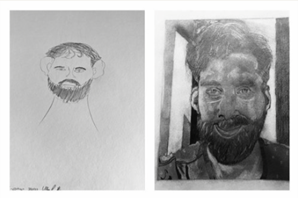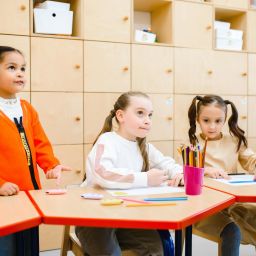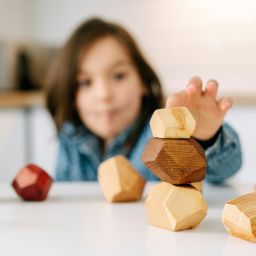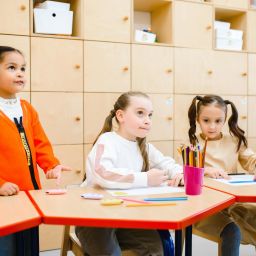
You may have heard of the importance of a “growth mindset” in areas like work, school and our personal lives. What has not received nearly as much attention is the importance of this concept when it comes to our children’s view of their own abilities and capacity for positive development. By instilling this First Habit early on and making it their default way of approaching challenges, we can effectively counteract many of the limitations that are placed on our children by others, themselves and society at large.
The Power of a Growth Mindset: Unlocking Potential in Children
In her esteemed book, Mindset, Carol Dweck outlines the long-term impact of a fixed mindset – those of us who believe our abilities are fixed – and a growth mindset – those who believe abilities can be consciously developed over time. Unfortunately, many of us have learned from society that “failure has been transformed from an action (I failed) to an identity (I am a failure).” What’s more, stories like the Tortoise and the Hare demonstrate to our children that only when the talented person drops the ball can the underdog succeed. This sends the message that either you have ability (the hare) or you expend effort (the tortoise).
If you are like most people, you are quick to say, “Of course I have a growth mindset – I am open minded and encourage learning and self-improvement.” But what if we told you this blanket assumption was a common misconception? Ask yourself this: are there times when you have questioned whether your child’s ability or potential are fixed? Have you or anyone in your child’s life ever been quick to say, “Bobby is a natural at math…Eva is the one with the great memory… Jasmine is the athlete of the family… Luke is the social butterfly.” Do statements like these convey talent as a fixed or a modifiable attribute? Do you think kids notice what these labels imply, that one child is inherently more or less able to excel in a given area? Or that a peer is already the leader in one personality trait and therefore there’s no room for their own growth in that area? You bet they do.
Take this excerpt from Carol Dweck on the contrast in her experience between children:
To figure out how kids cope with challenge, I gave ten year olds some problems that were a little too difficult for them. Some of them reacted in a shockingly positive way. They said things like, “I love a challenge!” or “I was hoping this would be informative!” They understood that their abilities could grow through their hard work. They had what I would call a “growth mindset.” But for other children it was tragic, catastrophic from their more fixed mindset perspective their core intelligence had been tested and devastated. Instead of the power of “yet” they were gripped by the “tyranny of now.”
Fixed Mindset vs. Growth Mindset: Shaping Children’s Beliefs About Abilities
So, from there the question becomes, do you believe your child’s ability to perform athletically is based on natural ability? Or could the right breathing and balance techniques implemented from an early age propel them to a completely different level of performance and “natural” ability? Could the elevated foundation from these skills allow them to focus far more attention on other advanced components of their craft? Is their performance in school solely a summation of their innate intellect combined with the completion of the required schoolwork? Or is it far more multifaceted and adaptable than that? If say, you could increase your child’s reading speed by 1.5x and memorization capabilities by 2x with the same level of effort, wouldn’t that elevate their academic performance dramatically, not to mention their confidence and enjoyment in learning? Or even if these levels were only raised by a tenth of a point, wouldn’t that set them apart from their peers and also compound meaningfully over time?
First Habits lays out the importance and framework for achieving these developments here. But instilling these abilities in your child will only go as far as your (and their) belief that these abilities can be developed. If you, or your child, do not believe in incremental change, why put in the work to try? Let’s look at examples of the power of this phenomenon.
Transforming Skills Through a Growth Mindset: The Surprising Impact
How would you describe your free hand drawing ability? Picasso-like? Great? Meh? Terrible? If you are like most people, you would answer one of the latter options. Most of us are quick to apologize in advance for any drawing situation, “I am sorry but I need to warn you I failed kindergarten art class and never recovered!”
If any of this resonates with you, the images below may be startling. In Mindset, the author gives the example of the “Drawing On the Right Side of the Brain” class that insists on a transformational impact in drawing ability in only 5 days. “Transformational” may sound like a strong claim, but I will let you be the judge based on some the before / after portraits that follow:



(Check out many more examples and the drawing course website here: https://www.drawright.com/before-after )
The first thought that comes to mind is that the sketches on the left are done by a grade school student and a professional artist did the ones on the right. The shadowing, the intricate detail, the realistic nature of the images all lead you to believe that someone with years of art training created the “after” images. And you certainly would not have expected the dramatic change in ability was possible at all, let alone in 5 days? I must admit that despite studying these topics for a while and being familiar with growth mindset, I was shocked at the apparent progress in artistic ability.
Now First Habits is not about learning to draw. It is about ingraining high leverage habits early that will compound over a lifetime. Let’s now turn to a foundational First Habit skill: breathing. For more detail on the critical importance of proper breathing, see our post here and list of other resources here. For now, let’s think about how growth mindset correlates to this all important skill. Is how you breath changeable? How many feet down could you dive into water and be comfortable? How long can you hold your breath? Maybe you would agree these are skills you could develop, but what is your first reaction to how much change would be possible with some effort? I think many of us would first assume that with some effort maybe you could dive 12 feet instead of 10, or hold your breath for one and a half minutes instead of one minute. However, in his book, Breath, James Nestor includes the following epiphany of his own in the intro:
“When most people go under water in a pool they bail out at ten feet after just seconds, ears screaming. The freedivers told me they’d previously been “most people”. Their transformation was a matter of training; they’d coaxed their lungs to work harder, to tap the pulmonary capabilities that the rest of us ignore. They insist they weren’t special. Anyone in reasonable health willing to put in the hours could dive to 100, 200, even 300 feet. It didn’t matter how old you were, how much you weighed, or what your genetic makeup was. To freedive, they said, all anyone had to do was master the art of breathing.
To them breathing wasn’t an unconscious act; it wasn’t something they just did. It was a force, a medicine, and a mechanism through which they could gain almost superhuman power”

If the right techniques applied consistently could take an average adult who is in tremendous discomfort diving ten feet underwater and allow them to dive to depths of three hundred feet, how effective is a growth mindset. Without that perspective, no one would ever imaged that three hundred feet was possible. Maybe fifteen feet or eighteen feet, but not three hundred. What impact could the right techniques have on your child applied carefully and from an age where their body and mind are still actively developing?
The truth is, we all have a growth mindset in some areas and fixed mindset in others. The key is being aware that those beliefs exist and being conscious of what messaging we are sending to our children – both explicitly and subtly, from us as parents as well as teachers, friends and anyone else that our child interacts with.
Implementing a Growth Mindset in Children: Key Tactics for Parents
So how can you implement a growth mindset in your kids? Here are a few key tactics that are simple enough to gradually incorporate into your daily language:
- Avoid language that implies capabilities or personality characteristics are fixed. Steer clear of labeling people or abilities in a way that deemphasizes your child’s capacity for growth.
- When encouraging your children, instead of complimenting their abilities or outcomes, focus on their process. Instead of telling them they are smart or are a winner, tell them you are so proud of the hard work they put in, their persistence, their reaction to hardship, and the thought they put into crafting effective strategies.
- Adopt a “yet” mindset. When encountering challenge or failure, make it clear that these are not final or condemning. Rather, while success or progress may not have happened yet, they might just be a course correction away.
The right First Habits can help your child excel in many areas across their life, including self-control, intellectual ability, physical capability, and emotional wellbeing. Keeping a growth mindset at the forefront will allow you to maximize these life changing techniques and ensure that the First Habits that you employ will never be limited by a fixed mindset.















